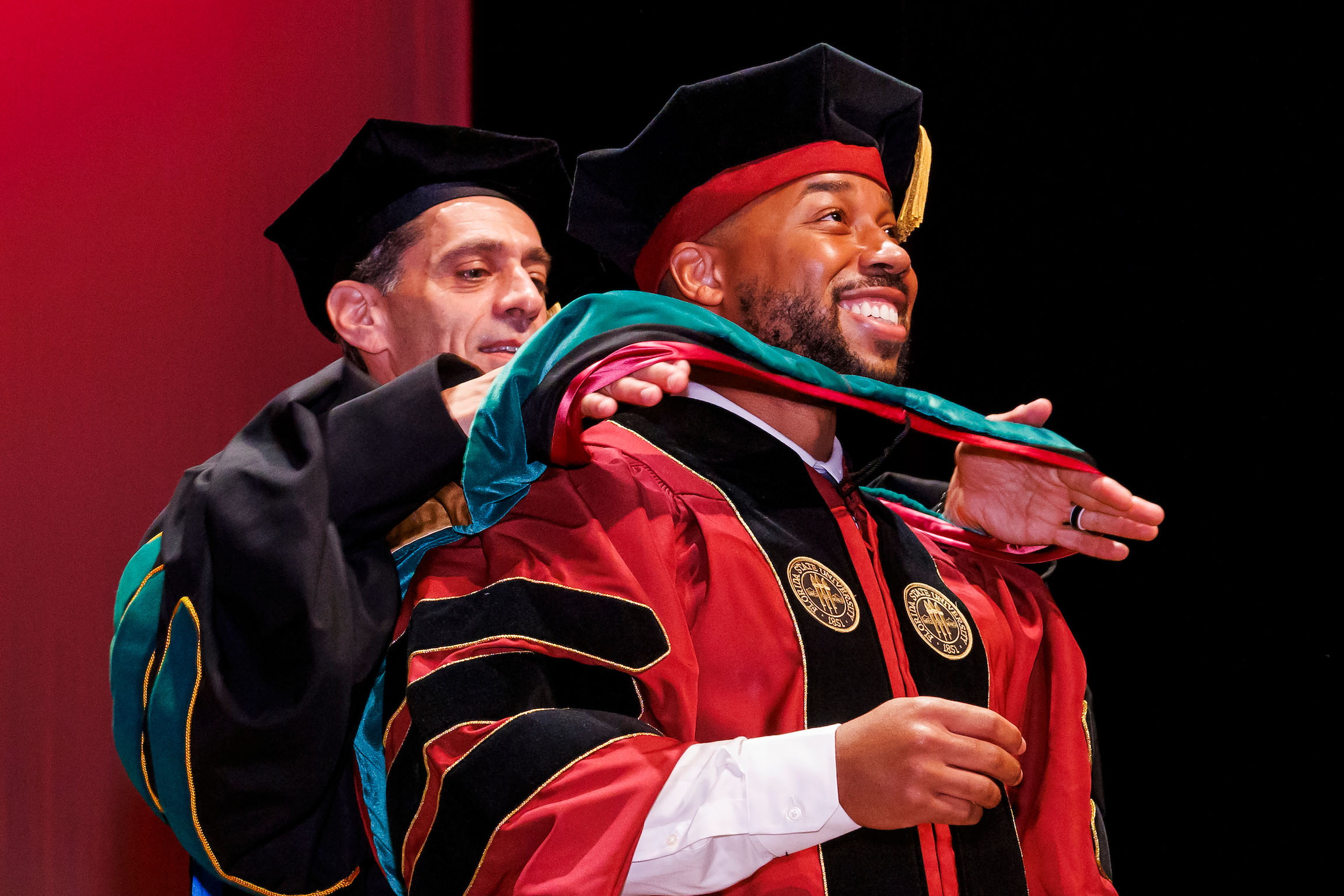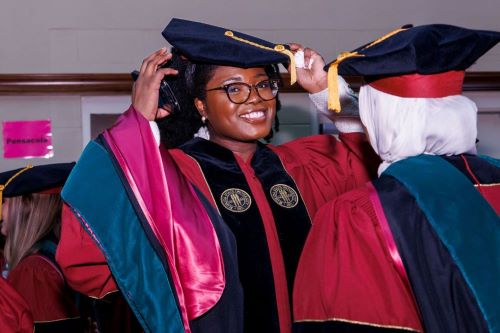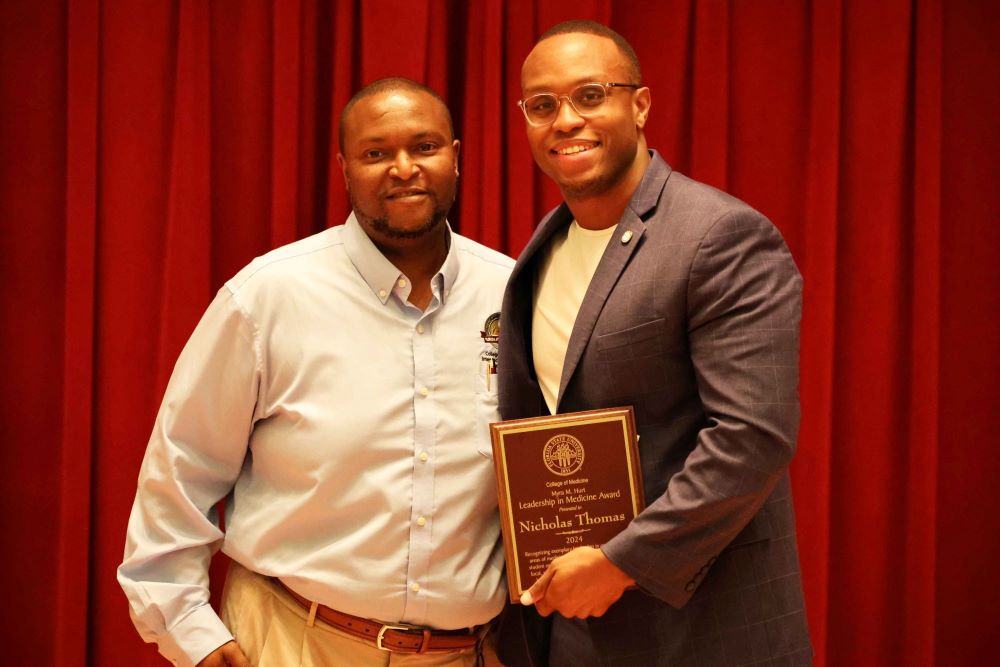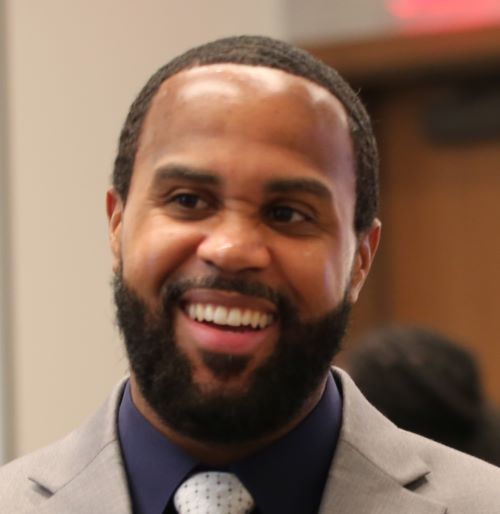Mentored down pathways to orthopedic surgery
The M.D. Class of 2024 notched a significant achievement for the Florida State University College of Medicine with four graduates heading to residency programs in orthopedic surgery.
Decorian “Corey” North will continue his training at the University of Alabama Medical Center in Birmingham, Ala.; Nicholas “Nick” Thomas at Vanderbilt University Medical Center in Nashville, Tenn.; Barbara Pierre Louis at Yale University-New Haven Hospital in New Haven, Conn.; and Matthew “Matt” Williamson at Orlando Health.
“While we are obviously proud of all our graduates, to have matched four in such a competitive specialty as orthopedic surgery is quite an accomplishment for each of them and for our College of Medicine,” Interim Dean Alma Littles, M.D., said. “We know they will carry our mission of patient-centered health care and being responsive to community needs with them throughout their careers.”
Orthopedic surgery focuses on bones, joints, muscles, tendons, and ligaments.
The National Institutes of Health reported earlier this year that in 2022, 40% of applicants failed to match in orthopedic surgery, despite each having applied to an average of 72 programs. These were talented, dedicated applicants; there just aren’t enough residency slots available to train orthopedic surgeons to treat a growing, and graying, population.
Adding a layer of sheen to an already impressive feat, three of the four – North, Pierre Louis and Thomas – are from underserved, underrepresented communities and have overcome challenges many can only imagine.
What made the difference for them? Pathway programs and mentoring.
“We can’t downplay the extreme hard work, resilience and grit these students have shown in matching in one of the most competitive specialties in medicine and doing it at some of the best programs in the country,” said Senior Associate Dean for Interdisciplinary Medical Sciences Anthony Speights, M.D. “That’s impressive for all who achieve it, but matching three students from an underrepresented demographic into these orthopedic residencies reinforces how integral pathway programs and strong mentorship can be.”
Speights also directs the Bridge to Clinical Medicine master’s degree, which gives students with great potential who aren’t quite ready for medical school extra training to get them prepared. Students who successfully complete the rigorous yearlong program are automatically accepted into the next M.D. class, which starts 10 days after their Bridge graduation.
Both Thomas and Pierre Louis went through the College of Medicine’s Bridge program. North went through a similar master’s program at the University of Central Florida (UCF). All three have faculty mentors. Thomas and Pierre Louis additionally found mentors outside the College of Medicine and made lifelong friends in the process. Although North didn’t connect with external mentors, he sees the value.
“The earlier you get that exposure, the better,” North said.

Getting into medical school is extremely difficult, he said, as is making the match you want. “It’s a mission you have to start early, and you have to do well in your studies.”
The Port St. Joe native’s journey to orthopedic surgery took a meandering path, starting with heavy involvement in sports while growing up. Sports led him to weightlifting, which led him to anatomy and physiology as an undergraduate student at FSU. He considered several medicine-related fields, including pharmacy, physical therapy, and becoming a personal trainer or an athletic trainer. He did a lot of shadowing and a lot of volunteer work.
“I graduated with the intent of getting a master’s in health care administration. Then I realized it wasn’t for me,” he said.
North moved to Orlando with his good friend and roommate, Devin Sapp, to get his master’s at UCF. At that point, he was planning to go to dental school.
“I was kind of all over the place,” he said.
Sapp asked him why he didn’t study medicine. North said he honestly hadn’t thought about it, and he called it a “pie in the sky” dream.
But a seed had been sown that ultimately led him to medical school. While North wasn’t sure what he wanted to do, he knew that he wanted to do something that made him as happy and fulfilled as Sapp, who was studying industrial psychology.
“I wanted to feel what he was feeling,” North said.
After that, he said, things fell into place.
“I got to witness actual orthopedic surgery, and I thought it was amazing,” North said, his eyes lighting up at the memory. “It was the coolest thing I’d ever seen.”
North finally knew what he wanted to do. Like Pierre Louis and Thomas, he was an outstanding medical student. All three were among the honorees at the class awards ceremony the day before graduation.
Orthopedic surgery residencies are five years, and he plans to do a fellowship afterward. He’s lived in Florida his whole life, so he’s looking forward to seeing what life is like somewhere else. His heart, however, will always be in the Florida Panhandle.
Barbara Pierre Louis didn’t start school until she was 10 years old in her native Haiti.

“You have to have money to go to school in Haiti, and we didn’t have it,” the third of her mother's five children said. “My mother persuaded her pastor that the church should start a free school.”
The girl who was called “Francie” as a child was a quick study, though. When she was 14, the family joined her father and grandfather in Miami; four years later, she began her undergraduate studies at the University of Florida, graduating cum laude with a bachelor’s degree in biochemistry and molecular biology. She is the first in her family to finish high school, go to college and graduate from medical school.
Although she was involved in biomedical research at UF and briefly joined a Ph.D. program there, her heart was in patient care. Early in her Bridge and medical school training, she was drawn to orthopedic surgery. The scarcity of Black women in the specialty fueled her fire for better representation of women and people of color.
She was accepted as an Nth Dimensions Scholar, which included a summer internship after her first year of medical school and opened the door to mentors, research opportunities, scholarships, and hands-on experience. The organization’s mission is to eliminate health care disparities by diversifying the physician workforce, and it promotes itself as “the most successful pipeline program in the U.S. for women and minorities seeking competitive specialties.”
“I spent a month that summer with Dr. Leslie Barnes Remski, an orthopedic and trauma surgeon in Pensacola,” Pierre Louis said. “To have a Black woman orthopedic surgeon teach me, mentor me, was amazing.”
When Pierre Louis first observed her in surgery, Barnes Remski made her hold the hammer she was using and get the feel of it. The experience was transformational.
“I could see myself in her, could see myself doing the same thing," she said. "It was so empowering.”
Pierre Louis also conducted global health research with Dr. Colleen Sabatini, a renowned pediatric orthopedic surgeon at the University of California San Francisco. She credits the College of Medicine faculty and her Nth Dimensions experiences with helping her match at Yale-New Haven. Dr. Claudia L. Thomas, the first Black female orthopedic surgeon in the country, went through the same residency program from 1975 to 1980, after graduating from medical school at Johns Hopkins University.
“Yale accepted three Black women this year, for the very first time,” Pierre Louis said proudly. “The numbers are looking up.”
Thomas was inspired to pursue orthopedic surgery because of the care his nephew Kahlil Gilzene, who was born with cerebral palsy, received from orthopedic surgeons, improving his quality of life. Thomas was only 6 when his sister became a teen mom. Along with his mother, Opal Thomas, who is a nurse, young Nick sometimes accompanied his sister and nephew to medical appointments.

“I was driven by the idea of being able to accomplish and do the things that these surgeons have done for my family and pay it forward in the future,” he said.
He praised the College of Medicine faculty and staff for pushing students, particularly minority students, to consider specialties in which they are underrepresented.
“Dr. Anthony Speights has been my mentor since Day 1,” Thomas said. “He has been the person who has driven me and kept me on the right path as far as chasing my dreams and not letting anyone deter me from my goal.”
It didn’t matter that Speights’ specialty is OB/GYN and not orthopedic surgery, he said. He was a sounding board who listened, guided and cared.
Thomas connected with one of his research mentors, Dr. Kevin Shea at Stanford University, after reading a journal article Shea had published about pediatric knee development using pediatric cadavers. Thomas acknowledged it is sad in the sense that a child has died, but it also presents an opportunity to learn about pediatric development. His class was in the anatomy lab at the time, working with adult cadavers, so things clicked. He emailed Shea, told him he’d read the article, enjoyed it, and would love to talk more about it.
“I sent out a lot of cold emails and I got a lot of non-responses, a lot of ‘no’s’, but Dr. Shea said ‘yes.’ He agreed to meet with me via Zoom,” Thomas said. “He allowed me to join his research team, kept up with me, made sure I was doing OK. He also offered to meet up with me at research conferences.”
Thomas said Shea championed him in many ways, advocating for him for different programs and getting his name out there.
"It allowed me to meet and network with surgeons from around the nation, listening to their stories and being inspired by what they’re doing both in research and in medicine,” he said. “That’s where I see myself going, and it’s been amazing to have that in my corner.”
Thomas met College of Medicine alumnus Rashad Sullivan (M.D., 2013) in Tampa while shadowing a doctor at the Florida Orthopedic Institute. Sullivan was completing an orthopedic surgery fellowship.
“I recognized him from the alumni website and was able to connect with him there and talk with him by phone later,” Thomas said. “He gave me the best advice: ‘Just stick with it. There aren’t a lot of us.’”
Even though people who identify as non-Hispanic Black comprise 12% of the U.S. population, they’re only 5.7% of physicians, according to the U.S. Department of Health and Human Services. Hispanics make up 18.9% of the population but only 5.8% of physicians.
Minority underrepresentation is particularly acute in orthopedic surgery.
According to the 2022 Physician Specialty Data Report by the Association of American Medical Colleges (AAMC), the percentage of Black orthopedic surgeons is a dismal 1.9%. The numbers for orthopedic surgeons who identify as Hispanic are only slightly better at 3.3%. Women make up only 6% of orthopedic surgeons, with Hispanic women at 2%. Black female orthopedic surgeons are even more rare; 0.6%.
Sullivan went through a similar experience as North on his journey. He said he hadn’t even considered going into medicine and was planning a career as a physical therapist when his biology professor at Florida A&M University, Willie Washington, asked would he rather be a surgeon.

“I didn’t know that was an option,” Sullivan said. “I walked out of his office and changed my major to biology/pre-med.”
The number of physicians from underrepresented communities in all specialties is slowly increasing, but orthopedic surgery is behind most others. Pathway programs such as the ones at FSU are making a difference.
“There’s too much evidence, too much data that supports that diversity in any field, medicine or sales, is a lot better for the company and the people they help, but especially in medicine,” Sullivan said.
Mentors are important, he agreed, but he cautioned that the burden of diversifying the field should fall on the system, not on the mentors or the aspiring physicians.
He was the first Black orthopedic surgery resident to finish the program at Wake Forest University, he said, “but it wasn’t because of me. It was because things were changing. We had a new program director who saw how having a diverse set of residents helped the program and the community.”
Since then, the numbers of successful Black and female orthopedic residents have continued to increase at Wake Forest and elsewhere, which will translate into better percentages in practice.
The number of female and minority medical students is also increasing. The AAMC reported that for the 2022-23 academic year, the number of Black students increased by 9%, the number of first-year students who were Black men increased by 5%, and the number of Hispanic students rose by 4% to comprise 12% of medical students overall.
Thomas, too, noted that the number of Black orthopedic residents has grown to almost 6%.
“Once we are able to tap into those specialties, as we are doing currently, it’s going to be better for the patients, because patients are going to feel more comfortable being seen by a physician who looks like them, as well.”
Research has shown that patients are more likely to be open with physicians who look like they do and share cultural backgrounds. They are also more likely to follow their advice, leading to better outcomes.
Change takes time, and the need for mentors and pathway programs remains.
Speights noted that he mentored North, Pierre Louis and Thomas as they moved through medical school, “and while I’d like to think I gave them sound advice, there was no magic potion. All they needed, as with so many of our pathway students, was an understanding of what was needed to succeed and to know that we believed in their ability to do it.
“The magic is already there. They just need to know how to use it.”
Contact Audrey Post at audrey.post@med.fsu.edu
Photo caption for Spotlight on Home page:
Nick Thomas, left, Barbara Pierre Louis and Corey North outside the FSU College of Medicine.
(Photo by Robert Thomas, FSU College of Medicine.)

